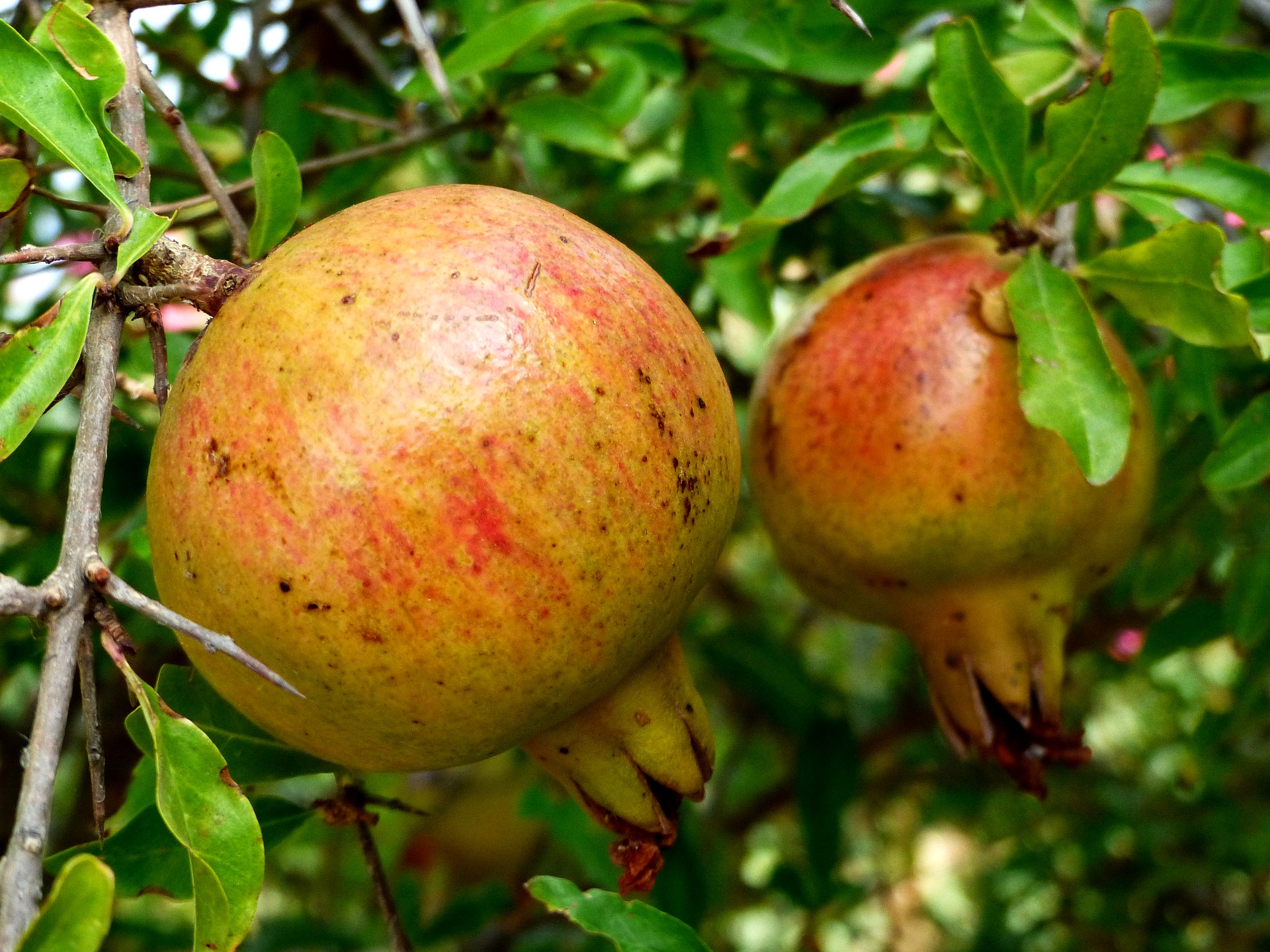Power of pomegranate
Power of pomegranate
The pomegranate (Punica granatum) is a fruit-bearing deciduous shrub in the family Lythraceae, subfamily Punicoideae, that grows between 5 and 11 m (16 and 36 ft) tall. The pomegranate was originally described throughout the Mediterranean region. It was introduced into Spanish America in the late 16th century and into California by Spanish settlers in 1769. The fruit is typically in season in the Northern Hemisphere from October to February and in the Southern Hemisphere from March to May.
For Muslims, the pomegranate is also a symbol of beauty, it is said to give beauty to those who eat it. The Prophet (P.B.U.H) states in a holy saying: Whoever eats a pomegranate, Allah will light his heart forty nights. The Prophet (P.B.U.H) has said in a holy saying: There is no pomegranate unless there is a seed in it from Paradise and I would like not to miss a single seed in it. Along with olive, dates and fig trees, the pomegranate tree is one of the four holy trees for Islam.
Pomegranates pack two unique substances that are responsible for most of their health benefits. Punicalagins and Punicic Acid. Punicalagins are extremely potent antioxidants found in pomegranate juice and peel. They’re so powerful that pomegranate juice has been found to have three times the antioxidant activity of red wine and green tea. Pomegranate extract and powder is typically made from the peel, due to its high antioxidant and punicalagin content. Punicic acid, found in pomegranate seed oil, is the main fatty acid in the arils. It’s a type of conjugated linoleic acid with potent biological effects.
As intact sarcotestas or juice, pomegranates are used in baking, cooking, juice blends, meal garnishes, smoothies, and alcoholic beverages, such as cocktails and wine. Pomegranates are widely cultivated throughout the Middle East and Caucasus region, north and tropical Africa, Iran, the Indian subcontinent, Central Asia, the drier parts of Southeast Asia, and the Mediterranean Basin. In Pakistan, Balochistan is the main producer of pomegranates, although Khyber Pakhtunkhawa and Punjab are also producing pomegranates in isolated areas on a small scale.
The fruiting comes in full swing within ten years of planting. Dwarf varieties are planted in pots for ornamental purposes rather than for their fruit. Pomegranate fruit has good staying quality and can be kept in cold storage for two to three months without any harm to its quality. The edible parts of pomegranate fruit is 52 per cent of total fruit weight, comprising 78 per cent of juice and 22 per cent seseeds.
The seeds are a rich source of total lipids, protein, crude fibres, ash, pectins and total sugars. 100 grams of pomegranate juice contains the following nutrients. Energy 346 kg, carbohydrates 18.7 g, sugar 13.7 g, fibre 4.0 g, fat 1.2 g, protein 1.7 g, thiamin 0.07 mg, riboflavin 0.07 mg, niacin 0.29 mg, pantothenic acid 0.38 mg, vitamin B6 0.08 mg, folate 38 µg, vitamin C 10 mg, calcium 10 mg, iron 0.3 mg, magnesium 12 mg, phosphorus 36 mg, potassium 236 mg, zinc 0.35 mg.
Pomegranate is rich in calcium, phosphorus, iron, vitamin C, and folic acid. It is an anti-oxidant, blood thinner, reduces systolic BP and heart related problems. It is believed to help prevent Alzheimer’s disease and gives protection to arteries. One glass of pomegranate juice daily is considered ideal to remain in good health.
Pomegranate juice helps to reduce fat around the stomach, risk of stroke, kidney disorders and regulates frequency of urine. Pomegranate has the power to treat jaundice and cough. The juice of the young leaves is styptic and was given to young children suffering from dysentery by grannies. Bark of the trunk expels intestinal worms and also reduces enlarged spleen. The juice is also used to make jellies, beverages and hot and cold sauces for seasoning of cakes. Pomegranate juice is a panacea for high blood pressure and cardiac patients. The juice can also fight cancers and prevents many other disorders.
Pomegranate has strong Anti-Inflammatory Effects. Chronic joint pain can be debilitating, to say the least. With the regular addition of pomegranate to your diet, consumers can enjoy a reduction in symptoms relating to inflammation. Improve Your Memory through Polyphenols. Visibly rejuvenate your skin.
Laboratory studies suggest that pomegranate extract may slow cancer cell reproduction and even induce apoptosis, or cell death, in cancer cells. The prostate-specific antigen (PSA) is a blood marker for prostate cancer. Men whose PSA levels double in a short period of time are at an increased risk of death from prostate cancer. Breast cancer is one of the most common types of cancer in women. Pomegranate extract may inhibit the reproduction of breast cancer cells even killing some of them.
Pomegranates are one of the healthiest foods on the planet, packed with nutrients and powerful plant compounds. If you want to reap the many health benefits pomegranates have to offer, either eat the arils directly or drink pomegranate juice.
Written by: Maham Hassan



